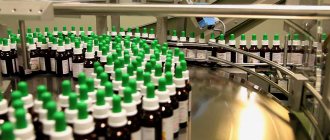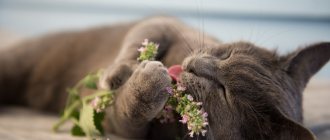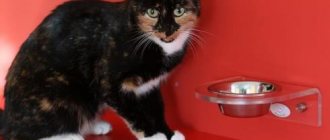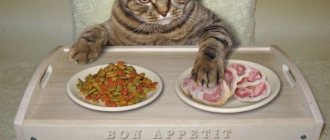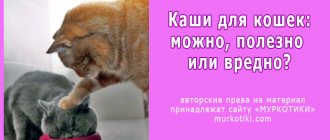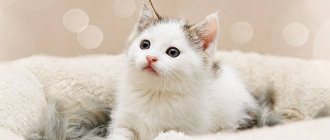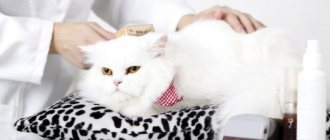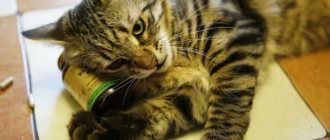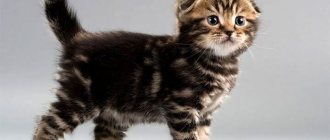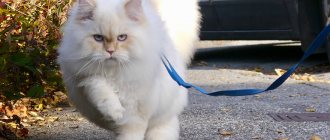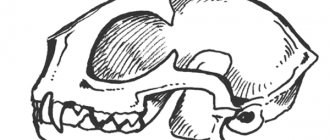Dysbacteriosis is dangerous for both humans and animals. The intestinal microflora is disrupted, resulting in health problems. Probiotics for cats consist of yeast and bacteria that normalize the digestive system and are also prescribed for kidney disease, diabetes, infectious diseases and during antibiotic treatment.
Why are they needed?
Probiotics should be given to a cat to restore intestinal microflora in the following cases:
- Malabsorption. This is a condition when nutrients are poorly absorbed in the digestive system, resulting in diarrhea.
- Detox. It is carried out after antibiotics, since taking these drugs is very toxic and disrupts the natural microflora in the body.
- Kidney failure. In animals it often occurs as a consequence of hyperthyroidism. In this case, it is recommended to give the cat food with probiotics.
Lactobacilli take part in the synthesis of B vitamins, which are necessary for small cats to gain weight and grow.
Causes of dysbiosis in cats
The gastrointestinal tract of an animal is populated with beneficial microflora - trillions of microorganisms. There are up to 40 species.
They are:
- opportunistic (under certain conditions, with reduced immunity, they can cause pathology);
- pathogenic, those that cause disease when the population increases;
- neutral. They are necessary for the breakdown of feed components.
The microflora of the stomach is not large - lactobacilli and streptococci. Anaerobes and aerobes, lactobacilli, and bifidobacteria already live in the small intestine. The large intestine is even more populated. Among it are E. coli and enterococci, staphylococci, proteus, streptococci, clostridia, microscopic fungi (yeast-like).
All microflora, normally, are found in the body in strict proportions. Microorganisms get along well and each plays its role.
Deviations in one direction or another are caused by dysbacteriosis. The cause of the deviation can be not only irregularities in the feeding of the animal, but also seemingly completely unpredictable factors:
- stress (change of home, owner, appearance of new “family” members);
- hypothermia;
- overheating;
- excessive physical activity (long walks);
- helminthic infestation;
- chronic inflammatory diseases.
All these factors lead to decreased immunity. When the resistance (ability to resist) of the organism decreases, the virulence (toxicity) of microorganisms increases. Opportunistic and pathogenic microorganisms are activated. There are more of them. They conquer space, thereby infringing on beneficial microflora, the level of which becomes lower.
Such consequences are often caused by the unsystematic use of antibacterial agents (antibiotics, sulfonamides, nitrofurans); they affect the entire microflora without considering the status, thereby provoking dysbacteriosis.
Types of probiotics
They are divided into several types:
Among the monocomponent drugs, you can choose Biovestin for your animal.
- Monocomponent. Such preparations contain only one type of beneficial bacteria. The list of the best remedies includes the following names: “Bifidum”;
- "Biovestin".
- "Linex";
- "Bactistatin";
Indications for use
A healthy body copes with all processes independently and does not require outside help. The intestinal microflora, subject to proper and balanced feeding, is capable of multiplying itself and “working” smoothly.
Probiotics are used for:
- diarrhea;
- constipation;
- bloating;
- gas formation;
- use of antibiotics and other bacterial drugs;
- diseases of the pancreas;
- pathologies of the kidneys and liver;
- acute infectious diseases of various etiologies;
- poisoning with dysfunction of the digestive system;
- when constantly feeding the cat dry food;
- suffered stress factors;
- with crowded contents;
- after visiting the pet hotel.
How to use?
In order for probiotics to bring maximum benefit to both kittens and adult cats, you must follow the following rules of administration:
When combining therapy with an antibiotic, it is worth taking a break between drugs for at least 2 hours.
- To improve cat health, it is recommended to give probiotic products that contain 2 or more types of beneficial bacteria.
- Medicines with bacteria are given in the morning on an empty stomach, so they are better absorbed.
- The dry additive is diluted with water in a ratio of 1:2, and the liquid additive is added to the feed.
- When taking antibiotics, medications with probiotics are given to the cat after 2 hours.
Probiotics: what they are, where they are found
Probiotics are a group of beneficial microorganisms, of which the most significant are:
- Bifidobacteria;
- Lactobacilli;
- Lactococci;
- Streptococci;
- Propionic acid bacteria.
Each species has several dozen strains, many of which belong to the group of lactic acid bacteria.
Probiotics are found in foods (feed), food additives, and are produced in dosage form - in dry and liquid form. Therefore, one way or another, they enter the body constantly, in various forms, forming a biocenosis - a favorable environment in the stomach and intestines of the host.
Side effects
Exceeding the dose of the drug can lead to bloating in your pet.
All probiotics are good for your cat's health. They strengthen the animal’s immune system and normalize the functioning of the gastrointestinal tract. But in case of overdose, beneficial substances can be harmful and lead to side effects. In large quantities, probiotic supplements cause cramping and bloating in cats and can cause diarrhea. Therefore, in order to avoid such unpleasant phenomena, before giving them to animals, you need to consult a veterinarian to select the correct dose.
Side Effects of Probiotics for Pets
Complete probiotic supplements generally have no negative effects on pets and are considered safe. Monopreparations, including only 1-2 strains of unidirectional action, can lead to undesirable consequences if they are selected incorrectly. Therefore, we recommend that you consult a veterinarian when prescribing a single drug.
If you're choosing fermented vegetables as your source of probiotics, it's best to start with small amounts and then gradually increase the amount to allow your digestive system to adapt. Feeding too many fermented vegetables can cause stomach upset.
List of drugs
Probiotic "Subtilis"
Subtilis is suitable for animals that have experienced stress.
A combined probiotic product that consists of B. subtilis and B. Licheniformis bacteria. Reception is indicated for indigestion, reduced immunity and stress. "Subtilis" is available in the form of a dry powder or liquid, which is given to animals with food or diluted with water for drinking. There are no contraindications to taking the drug, and in the correct dose it does not cause any side effects.
"Biovestin"
The product is given to cats to restore their natural microflora after consuming antibiotics, in case of food allergies, infectious diseases and stressful situations. Biovestin is recommended to be taken with food or half an hour before eating. For effective therapy, the drug is used for at least 2 weeks.
Probiotic "Bifidum"
This drug can also be given to an animal for preventive purposes.
This is a monocomponent biologically active supplement that is used for diarrhea, poisoning, mastitis, to increase the animal’s body’s defenses, and also for detox when using antibiotics. After taking the drug, the symptoms of digestive disorders disappear within 24 hours. “Bifidum” is recommended to be given to kittens from 2 months of age both for the treatment of pathologies and for preventive purposes on an ongoing basis.
Havenaar R. proved in 1992 that probiotics are vital microorganisms that benefit the body of animals and humans, improving the functioning of the gastrointestinal tract.
Instructions for use of probiotics
There is no single correct instruction for the use of probiotics. Each preparation contains a certain microflora.
In any case, you should:
- adhere to the manufacturer's instructions;
- comply with storage conditions. They may differ significantly. For example, for some the manufacturer indicates from - 25 ᵒC to +25 ᵒC, and for others from +4 ᵒC to + 8 ᵒC;
- do not use after the expiration date;
- give preference to complex preparations that list the strains of microorganisms and the amount of at least 1.0x106 CFU/g;
- purchase only certified products and only in pharmacies.
It is necessary to clearly distinguish probiotics (those that contain microorganisms) from feed additives (contain amino acids, vitamins, microelements).
Which probiotic is most effective?
For a long time, the prevailing opinion was that cats do not need probiotic organisms, and the effectiveness of their use in improving pet digestion has been repeatedly disputed. But over the past 20 years, probiotics based on various species of enterococci have been proven effective, and in particular Enterococcus faecium SF68®, which became the basis of the probiotic supplement FortiFlora®. Regular addition of this supplement to your cat's diet maintains the balance of her intestinal microflora and helps ensure healthy digestion.
Read about the rules for caring for a domestic cat in the following article.
About healthy digestion of cats on our Yandex Zen channel.
How can you provide your domestic cat with prebiotics?
According to a number of studies, of all the foods included in a cat's diet when eating homemade food or economy-class food, the largest amount of prebiotics is found in wheat by-products: bran, sprouts and wholemeal flour, as well as in peanut husks, alfalfa, barley and grain of wheat. Therefore, when feeding homemade food, it is recommended to include the above sources of dietary fiber in your pet’s diet.
The best solution would be to choose a commercial diet containing prebiotic fiber in guaranteed quantities. Currently, inulin, a substance extracted from chicory root, is recognized as one of the best sources of dietary fiber for cats. It is added to PRO PLAN® Adult food for adult cats in an amount of 2%, which fully provides your pet with the benefits of consuming prebiotics.

